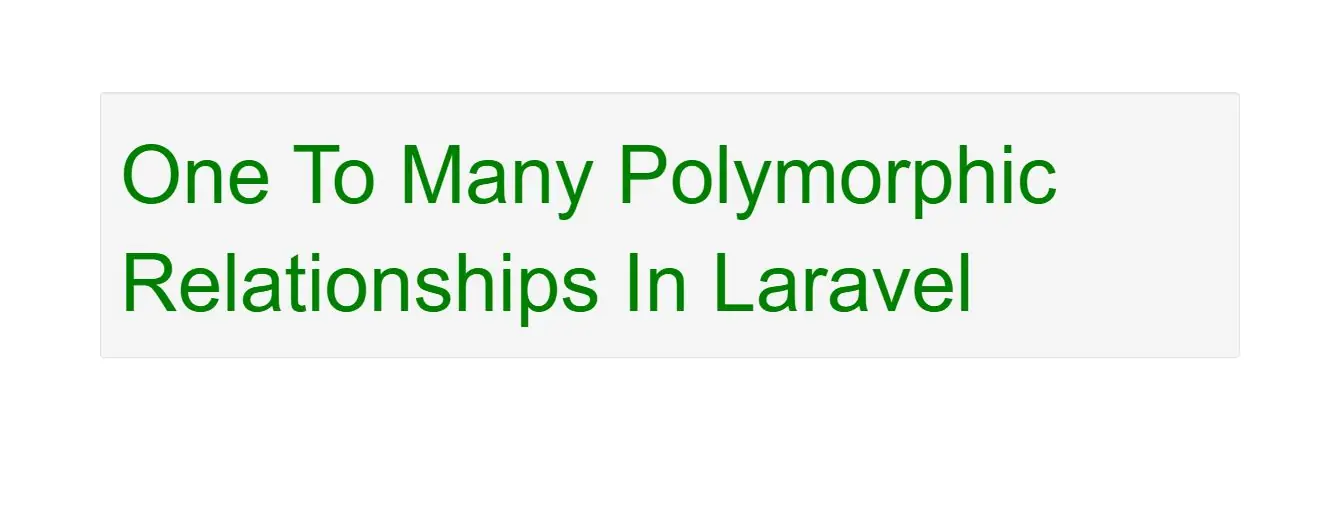
One To Many Polymorphic Relationships In Laravel
Lets start.
How to define One To Many Polymorphic Eloquent Relationship
1.Create laravel project and connect to database in .env file.
composer create-project laravel/laravel VideoApp --prefer-dist
2.Create Model and Migrate it.
To implement One To Many Polymorphic Relationships in Laravel, we need models: Posts,Video and Comment .
Now we need to create Posts,Video and Comment models in fresh project so for that run below commands in comand prompt.
php artisan make:model Post -m
php artisan make:model Video -m
php artisan make:model Comment -m
3.After Created Models we need to Implement code in Model and migration files as below
2020_09_07_111619_create_posts_table.php
<?php
use Illuminate\Support\Facades\Schema;
use Illuminate\Database\Schema\Blueprint;
use Illuminate\Database\Migrations\Migration;
class CreatePostsTable extends Migration
{
public function up()
{
Schema::create('posts', function (Blueprint $table) {
$table->bigIncrements('id');
$table->string('title');
$table->text('body');
$table->timestamps();
});
}
public function down()
{
Schema::dropIfExists('posts');
}
}
2020_09_07_132636_create_videos_table.php
<?php
use Illuminate\Support\Facades\Schema;
use Illuminate\Database\Schema\Blueprint;
use Illuminate\Database\Migrations\Migration;
class CreateVideosTable extends Migration
{
public function up()
{
Schema::create('videos', function (Blueprint $table) {
$table->bigIncrements('id');
$table->string('title');
$table->string('url');
$table->timestamps();
});
}
public function down()
{
Schema::dropIfExists('videos');
}
}
2020_09_07_132747_create_comments_table.php
<?php
use Illuminate\Support\Facades\Schema;
use Illuminate\Database\Schema\Blueprint;
use Illuminate\Database\Migrations\Migration;
class CreateCommentsTable extends Migration
{
public function up()
{
Schema::create('comments', function (Blueprint $table) {
$table->bigIncrements('id');
$table->text('body');
$table->integer('commentable_id');
$table->string('commentable_type');
$table->timestamps();
});
}
public function down()
{
Schema::dropIfExists('comments');
}
}
Migrate the schema files using the following command
php artisan migrate
Models
Post.php
<?php
namespace App;
use Illuminate\Database\Eloquent\Model;
class Post extends Model
{
protected $fillable = [
'name','body '
];
public function comments()
{
return $this->morphMany('App\Comment', 'commentable');
}
}
Videos.php
<?php
namespace App;
use Illuminate\Database\Eloquent\Model;
class Video extends Model
{
protected $fillable = [
'title','url'
];
public function comments()
{
return $this->morphMany('App\Comment', 'commentable');
}
}
Comments.php
<?php
namespace App;
use Illuminate\Database\Eloquent\Model;
class Comment extends Model
{
protected $fillable = [
'body','commentable_id','commentable_type'
];
public function commentable()
{
return $this->morphTo();
}
}
4.Create route and controller to access data.
Route in Web.php
Route::get('onetomanypoly','PolyController@onetomanypoly');
Create PolyController.php using below command in command prompt.
php artisan make:controller PolyController
Implement code in PolyController.php as below
<?php
namespace App\Http\Controllers;
use Illuminate\Http\Request;
use App\Comment;
use App\Video;
use App\Post;
class PolyController extends Controller
{
public function onetomanypoly()
{
$post = App\Post::find(1);
foreach ($post->comments as $comment) {
print_r($comment);
}
}
}
You may also retrieve the owner of a polymorphic relation from the polymorphic model by accessing the name of the method that performs the call to morphTo. In our case, that is the commentable method on the Comment model. So, we will access that method as a dynamic property:
$comment = App\Comment::find(1);
$commentable = $comment->commentable;
The commentable relation on the Comment model will return either a Post or Video instance, depending on which type of model owns the comment